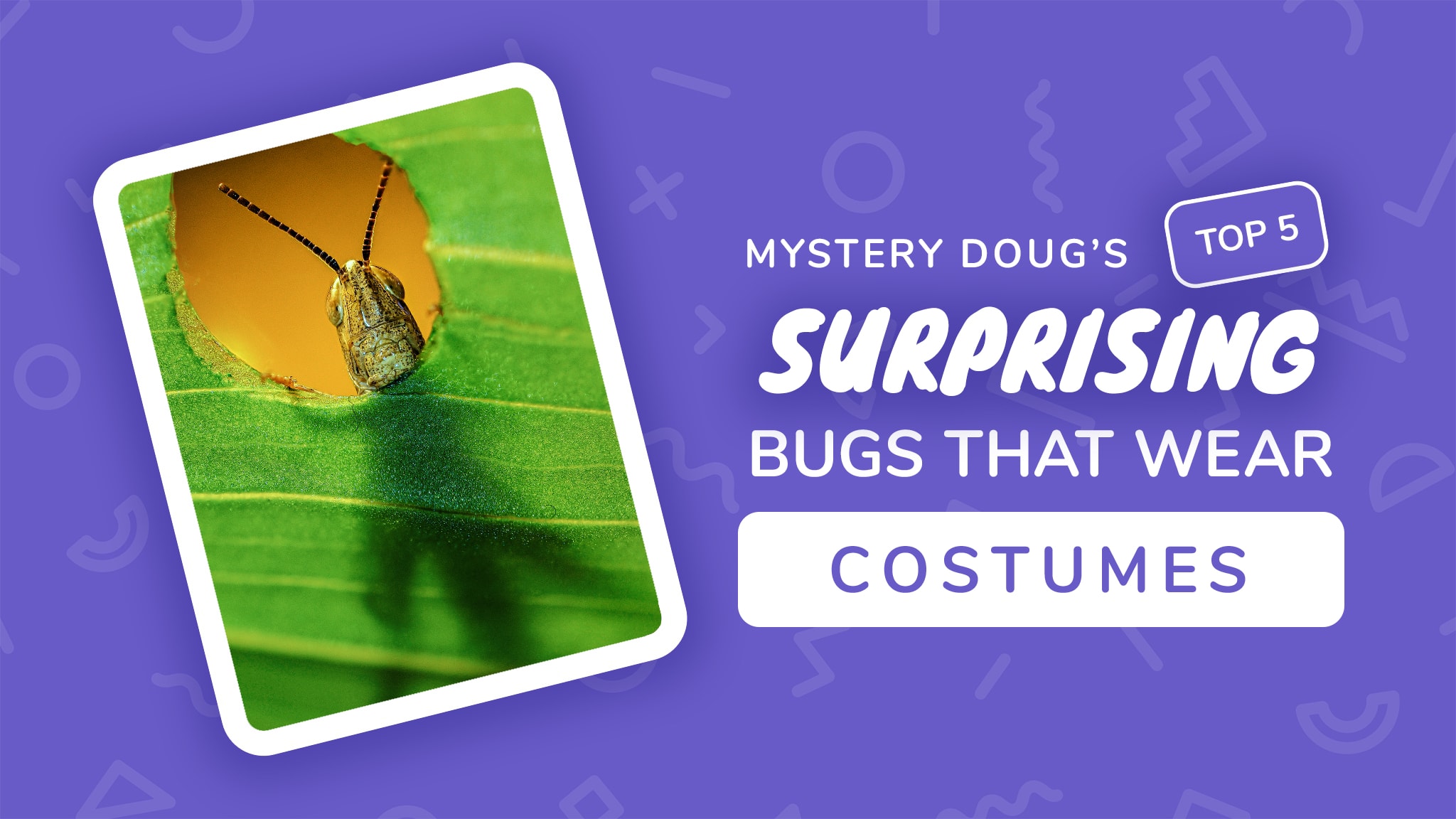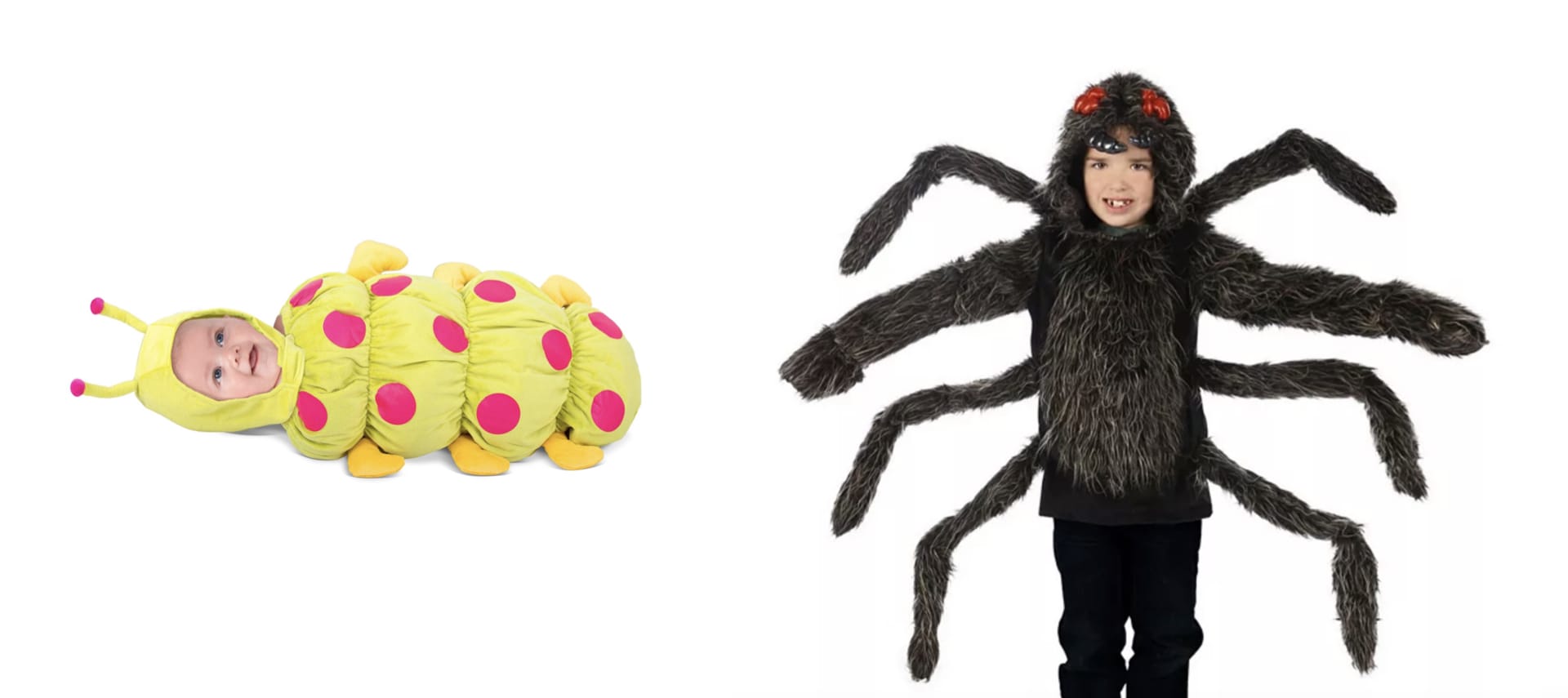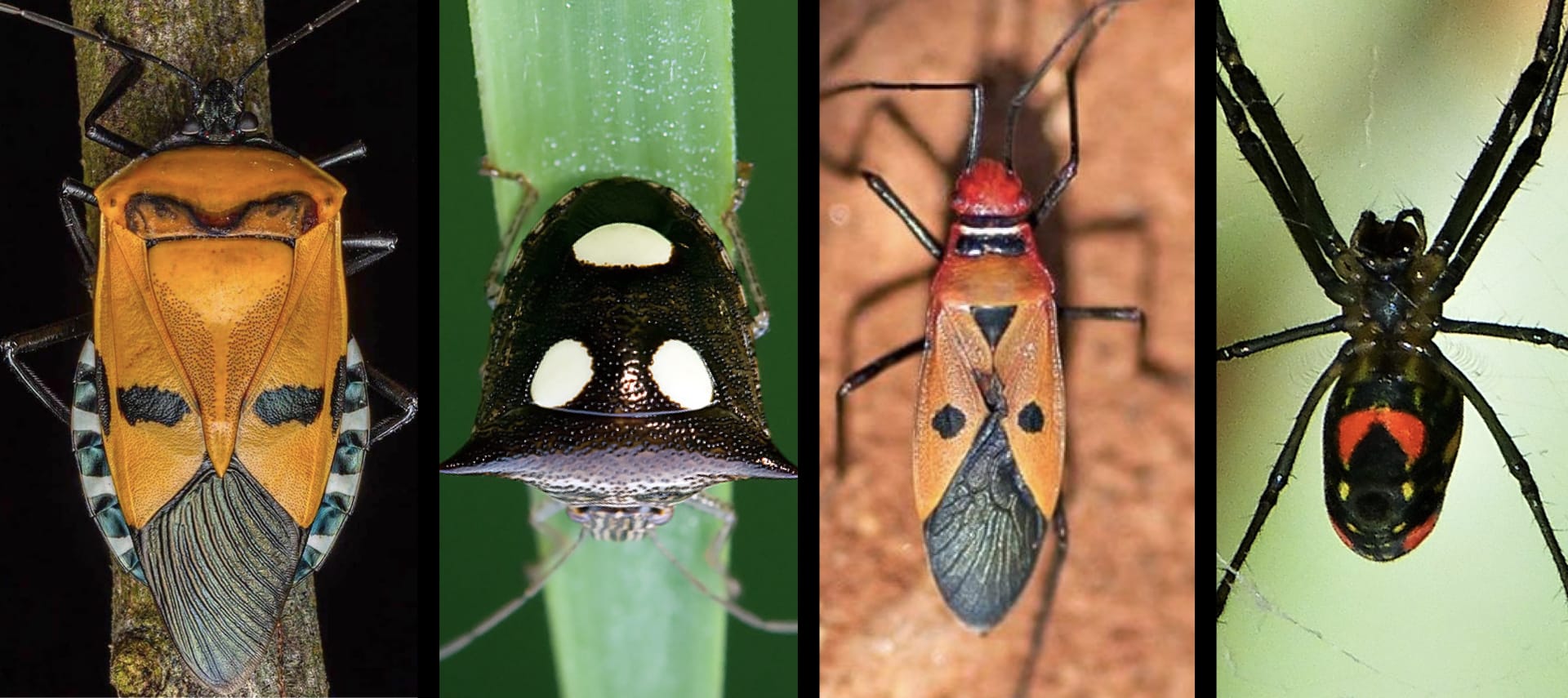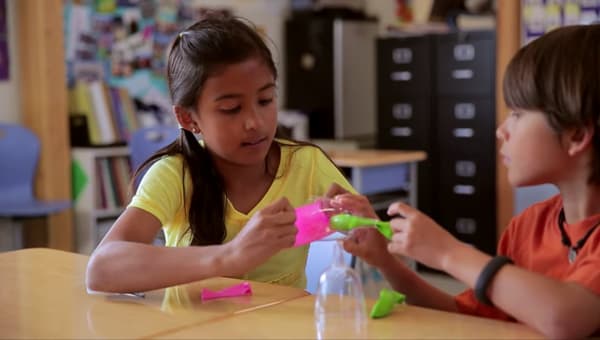
Please wait…
This video is having trouble loading. You may have lost your Internet connection.
Step 1: Click to Reload this page
Step 2: Click to
Try our other video player
Step 3: contact support if trouble persists.
Or,
dismiss this message.
Full Screen

Full Screen

Please wait…
This video is having trouble loading. You may have lost your Internet connection.
Step 1: Click to Reload this page
Step 2: Click to
Try our other video player
Step 3: contact support if trouble persists.
Or,
dismiss this message.
Full Screen

Full Screen

Please wait…
This video is having trouble loading. You may have lost your Internet connection.
Step 1: Click to Reload this page
Step 2: Click to
Try our other video player
Step 3: contact support if trouble persists.
Or,
dismiss this message.
Full Screen

People dress up in costumes to look like something else. Bugs
dress up in “costumes” too! What would a bug dress up as?
Full Screen

Please wait…
This video is having trouble loading. You may have lost your Internet connection.
Step 1: Click to Reload this page
Step 2: Click to
Try our other video player
Step 3: contact support if trouble persists.
Or,
dismiss this message.
These caterpillars (of bagworm moths) dress up as sticks. They wear
sticks so that predators—animals that want to eat them—don’t
notice them!
Full Screen

Please wait…
This video is having trouble loading. You may have lost your Internet connection.
Step 1: Click to Reload this page
Step 2: Click to
Try our other video player
Step 3: contact support if trouble persists.
Or,
dismiss this message.
Some caterpillars will also use leaves as a “costume”! Nothing
to see here—just a pile of leaves moving through the forest!
Full Screen

Please wait…
This video is having trouble loading. You may have lost your Internet connection.
Step 1: Click to Reload this page
Step 2: Click to
Try our other video player
Step 3: contact support if trouble persists.
Or,
dismiss this message.
Full Screen

Please wait…
This video is having trouble loading. You may have lost your Internet connection.
Step 1: Click to Reload this page
Step 2: Click to
Try our other video player
Step 3: contact support if trouble persists.
Or,
dismiss this message.
Another kind of bug (called a caddisfly) lives at the bottom
of almost every river. They make “costumes” from pebbles
and shells in the river...
Full Screen

Please wait…
This video is having trouble loading. You may have lost your Internet connection.
Step 1: Click to Reload this page
Step 2: Click to
Try our other video player
Step 3: contact support if trouble persists.
Or,
dismiss this message.
This “costume” helps them hide from predators! Think like an artist.
How could you get a caddisfly to “dress up” in jewelry like gold and
pearls, instead of “dressing up” in shells and pebbles?
Full Screen

Please wait…
This video is having trouble loading. You may have lost your Internet connection.
Step 1: Click to Reload this page
Step 2: Click to
Try our other video player
Step 3: contact support if trouble persists.
Or,
dismiss this message.
An artist left pebble-sized pieces of gold near the caddisflies, and
they covered themselves in it! Once the bug leaves its “costume,”
people use the empty case as jewelry!
Full Screen

Please wait…
This video is having trouble loading. You may have lost your Internet connection.
Step 1: Click to Reload this page
Step 2: Click to
Try our other video player
Step 3: contact support if trouble persists.
Or,
dismiss this message.
Full Screen

Please wait…
This video is having trouble loading. You may have lost your Internet connection.
Step 1: Click to Reload this page
Step 2: Click to
Try our other video player
Step 3: contact support if trouble persists.
Or,
dismiss this message.
These bugs are part of a group of insects called “assassin bugs.”
They’re fierce hunters that sneak up on their prey. Look what they’ve
caught…
Full Screen

Please wait…
This video is having trouble loading. You may have lost your Internet connection.
Step 1: Click to Reload this page
Step 2: Click to
Try our other video player
Step 3: contact support if trouble persists.
Or,
dismiss this message.
Some assassin bugs wear “costumes.” What do you think this
“costume” is made of? Go ahead and take a guess.
Full Screen

Please wait…
This video is having trouble loading. You may have lost your Internet connection.
Step 1: Click to Reload this page
Step 2: Click to
Try our other video player
Step 3: contact support if trouble persists.
Or,
dismiss this message.
The “costume” is actually the assassin bug’s dinner! Look closely and
you’ll see the leftovers from the meals this bug has eaten!
Full Screen

Please wait…
This video is having trouble loading. You may have lost your Internet connection.
Step 1: Click to Reload this page
Step 2: Click to
Try our other video player
Step 3: contact support if trouble persists.
Or,
dismiss this message.
Full Screen

Please wait…
This video is having trouble loading. You may have lost your Internet connection.
Step 1: Click to Reload this page
Step 2: Click to
Try our other video player
Step 3: contact support if trouble persists.
Or,
dismiss this message.
Check this out! Look closely at these plants. They have clumps of
foamy bubbles all over them! What could be making the bubbles?
Full Screen

Please wait…
This video is having trouble loading. You may have lost your Internet connection.
Step 1: Click to Reload this page
Step 2: Click to
Try our other video player
Step 3: contact support if trouble persists.
Or,
dismiss this message.
Let’s look in the bubbles! There’s a tiny bug! Watch closely as the bug
makes bubbles. It hides inside them when it’s a baby (larva).
Full Screen

Please wait…
This video is having trouble loading. You may have lost your Internet connection.
Step 1: Click to Reload this page
Step 2: Click to
Try our other video player
Step 3: contact support if trouble persists.
Or,
dismiss this message.
This kind of bug, called a spittlebug, is a baby in the spring. So when
it’s spring, look for their bubbles in plants! Can you find one?
Full Screen

Please wait…
This video is having trouble loading. You may have lost your Internet connection.
Step 1: Click to Reload this page
Step 2: Click to
Try our other video player
Step 3: contact support if trouble persists.
Or,
dismiss this message.
Full Screen

Most bugs don’t “wear” anything on their bodies. But some bugs do
have beautiful colors and patterns. And sometimes...
Full Screen

Please wait…
This video is having trouble loading. You may have lost your Internet connection.
Step 1: Click to Reload this page
Step 2: Click to
Try our other video player
Step 3: contact support if trouble persists.
Or,
dismiss this message.
...those colors and patterns almost look like masks! Depending on the
pattern, the masks can look happy, sad, or even surprised!
Full Screen

Please wait…
This video is having trouble loading. You may have lost your Internet connection.
Step 1: Click to Reload this page
Step 2: Click to
Try our other video player
Step 3: contact support if trouble persists.
Or,
dismiss this message.
Spiders have color patterns that can look like faces, too! This spider
lives in Hawaii and is called the happy-face spider!
Full Screen

Please wait…
This video is having trouble loading. You may have lost your Internet connection.
Step 1: Click to Reload this page
Step 2: Click to
Try our other video player
Step 3: contact support if trouble persists.
Or,
dismiss this message.
The next time you dress up—like at a costume party—I wonder what
you’ll dress as!
Full Screen

Full Screen

Please wait…
This video is having trouble loading. You may have lost your Internet connection.
Step 1: Click to Reload this page
Step 2: Click to
Try our other video player
Step 3: contact support if trouble persists.
Or,
dismiss this message.
Full Screen
Voting for this episode is now closed. Would you like to vote on the most recent poll?
We pulled three questions from our jar. Which question do you want to explore?

-
What's at the end of a rainbow?
-Addie, 3rd Grade
-
Are bumblebees and honeybees the same thing?
-Tyler, 1st Grade
-
How are marshmallows made?
-Kylah, 3rd Grade
Is the video not playing properly?
Please follow these steps:
- Very rarely a video will fail to completely load in your browser. Try to reload this page to see if that fixes the problem.
- If reloading does not help, try our other video player .
- If the video still fails to play, open this video in a new tab and please let us know you’re having trouble. We want to fix this issue for you.
Looking for a hands-on activity?
Try out a hands-on extension activity from Mystery Science.







